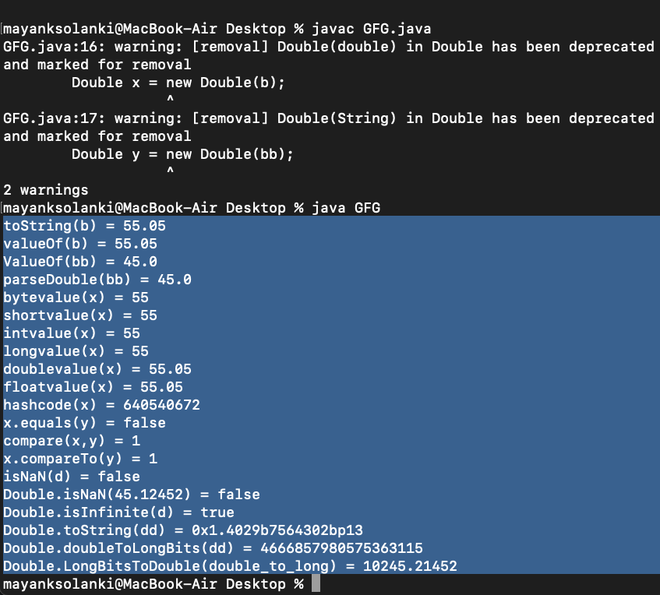Java Java类
Double 类是原始类型 double 的包装类,它包含几种有效处理 double 值的方法,例如将其转换为字符串表示形式,反之亦然。 Double 类的对象可以保存单个双精度值。 Double 类是原始类型 double 的包装类,它包含几种有效处理 double 值的方法,例如将其转换为字符串表示形式,反之亦然。 Double 类的对象可以保存单个双精度值。
主要有两个构造函数来初始化一个 Double-object。
A. Double(double b):创建一个使用提供的值初始化的 Double-object,其中它采用一个值作为参数进行初始化。
public Double(Double d) 参数:用于初始化的值
B. Double(String s):创建一个 Double-object,使用字符串表示提供的解析双精度值进行初始化,其中它将字节值的字符串表示形式作为参数。
Default radix is taken to be 10.
public Double(String s) throws NumberFormatException抛出异常:如果提供的字符串不代表任何双精度值,则抛出 NumberFormatException。
双类方法
| Method | Action Performed |
|---|---|
| byteValue() | Returns a byte value corresponding to this Double Object |
| compare() | Compare two primitive double values for numerical equality. As it is a static method therefore it can be used without creating any object of Double. |
| compareTo() | Used to compare two Double objects for numerical equality and returns a value less than 0,0, a value greater than 0 for less than, equal to, and greater than. |
| doubleValue() | Returns a double value corresponding to this Double Object. |
| doubleToLongBits() | Returns the IEEE 754 floating-point “double format” bit layout of the given double argument. |
| doubleToRawLongBits() | Returns the IEEE 754 floating-point “double format” bit layout of the given double argument. It differs from the previous method as it preserves the Nan values. |
| equals() | Compare the equality of two Double objects and returns true if both the objects contain same double value. |
| floatValue() | Returns a float value corresponding to this Double Object. |
| hashCode() | Returns the hashcode corresponding to this Double Object. |
| isInfinite() | Returns true if the double object in consideration is very large, otherwise false. |
| isNaN() | Returns true if the double object in consideration is not a number, otherwise false. |
| intValue() | Returns an integer value corresponding to this Double Object |
| longValue() | Returns long value corresponding to this Double Object. |
| longBitsToDouble() | Returns double value corresponding to the long bit pattern of the argument. |
| parseDouble() | Returns double value by parsing the string. |
| shortValue() | Returns short value corresponding to this Double Object |
| toHexString() | Returns hexadecimal representation of the argument double value. |
| toString() | Returns the string corresponding to the double value |
| valueOf() | Returns a Double-object initialized with the value provided |
| valueOf(String s) | Returns a Double-object initialized with the value provided |
执行:
Java
// Java Program to Illustrate Double Class
// Via Demonstrating Its Methods
// Class
public class GFG {
// Main driver method
public static void main(String[] args)
{
// Declaring and initializing
// double and String values
double b = 55.05;
String bb = "45";
// Construct two Double objects
Double x = new Double(b);
Double y = new Double(bb);
// Method - toString()
System.out.println("toString(b) = "
+ Double.toString(b));
// Method - valueOf()
// Return Double object
Double z = Double.valueOf(b);
System.out.println("valueOf(b) = " + z);
z = Double.valueOf(bb);
System.out.println("ValueOf(bb) = " + z);
// Method - parseDouble()
// Return primitive double value
double zz = Double.parseDouble(bb);
System.out.println("parseDouble(bb) = " + zz);
// Print statements
System.out.println("bytevalue(x) = "
+ x.byteValue());
System.out.println("shortvalue(x) = "
+ x.shortValue());
System.out.println("intvalue(x) = " + x.intValue());
System.out.println("longvalue(x) = "
+ x.longValue());
System.out.println("doublevalue(x) = "
+ x.doubleValue());
System.out.println("floatvalue(x) = "
+ x.floatValue());
int hash = x.hashCode();
System.out.println("hashcode(x) = " + hash);
boolean eq = x.equals(y);
System.out.println("x.equals(y) = " + eq);
int e = Double.compare(x, y);
System.out.println("compare(x,y) = " + e);
int f = x.compareTo(y);
System.out.println("x.compareTo(y) = " + f);
Double d = Double.valueOf("1010.54789654123654");
System.out.println("isNaN(d) = " + d.isNaN());
System.out.println("Double.isNaN(45.12452) = "
+ Double.isNaN(45.12452));
// Double.POSITIVE_INFINITY stores
// the positive infinite value
d = Double.valueOf(Double.POSITIVE_INFINITY + 1);
System.out.println(
"Double.isInfinite(d) = "
+ Double.isInfinite(d.doubleValue()));
double dd = 10245.21452;
System.out.println("Double.toString(dd) = "
+ Double.toHexString(dd));
long double_to_long = Double.doubleToLongBits(dd);
System.out.println("Double.doubleToLongBits(dd) = "
+ double_to_long);
double long_to_double
= Double.longBitsToDouble(double_to_long);
System.out.println(
"Double.LongBitsToDouble(double_to_long) = "
+ long_to_double);
}
}输出:
